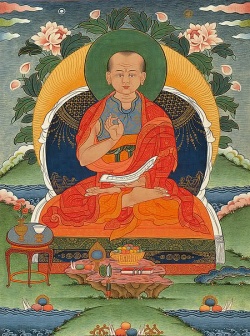Geshe Langri Tangpa
Geshe Langri Tangpa is an important figure in the lineage of the Kadampa and Gelug schools of Tibetan Buddhism. He was born in Central Tibet, as Dorje Senge. His name derives from Langtang, the area in which he is said to have lived. He was a Kadampa master, and disciple of Potowa.
In the 2nd water bird year he founded Langtang Monastery, as a Kadampa monastery. It later became a Sakya monastery.
He was the author of Eight Verses of Thought Transformation, considered a succinct summary of the Lojong teachings of Mahayana Buddhism. He is said to be an emanation of Buddha Amitābha.
(i)
With a determination to accomplish
the highest welfare for all sentient beings,
Who surpass even a wish-granting jewel,
I will learn to hold them supremely dear.
One is requesting: May I be able to view them as a precious jewel because they are the object on whose account I can achieve omniscience; so, may I be able to hold them dear.
(ii)
Whenever I associate with others, I will learn
to think of myself as the lowest among all,
And respectfully hold others as being supreme,
From the depth of my heart.
"Respectfully hold others as being supreme" means not regarding them as some object of pity that you look down on, but rather taking them as higher objects. Take, for example, insects: They are inferior to ourselves because they do not know the proper things to adopt and discard - whereas we do know because we see the destructive nature of the defilements. Such is the case, but we can look at the facts from another viewpoint as well. Although we are aware of the destructive nature of the defilements, we nevertheless let ourselves be under their influence, and in that sense we are inferior to insects.
(iii)
In all actions, I will learn to search into my own mind,
And as soon as an afflictive emotion arises,
Endangering myself and others,
I will firmly face and avert it.
When one is engaged in a practice of this kind, the only thing which causes obstacles is the defilements within one’s own mental continuum; on the other hand, spirits and so forth do not cause any obstacles. So, you should not have an attitude of idleness and passivity towards the inner enemy; but rather, you should be alert and forthcoming, countering the defilements immediately.
(iv)
I will cherish beings of bad nature,
And those oppressed by strong negativities and sufferings,
As if I had found a precious treasure
Very difficult to find.
These lines emphasise the transformation of those thoughts focused on sentient beings who have very strong negativities; generally speaking, it is more difficult to have compassion towards persons afflicted by sufferings and so forth, when they have a very bad nature and personality. Actually, such people should be regarded as the most supreme objects of one’s compassion. Your attitude, when you encounter such persons, should be as though you had found a treasure.
(v)
When others, out of jealousy, treat me badly
With abuse, slander and so on,
I will learn to take all loss
And offer the victory to them.
Generally speaking, if others have done you wrong without any justification, it is - in worldly terms - lawful to retaliate; but the practitioner of thought transformation techniques should always give the victory to others.
(vi)
When one whom I have benefited with great hope
Unreasonably hurts me very badly,
I will learn to view that person
As an excellent spiritual guide.
Then, regarding sentient beings for whom you have done a lot, normally you expect them to repay your kindness and thus you place hope in them. But instead, you should think: If such a person harms me instead of repaying my kindness, may I not retaliate against him, but rather reflect upon his kindness and be able to see him as a special guide.
(vii)
In short, I will learn to offer to everyone without exception
All help and happiness directly and indirectly,
And secretly take upon myself
All the harms and suffering of my mothers.
It says, "In short, may I be able to offer all the good qualities that I have to all the sentient beings," - this is the practice of giving - and, "May I be able secretly to take all their harms and sufferings of this and future lifetimes." This refers to the process of inhalation and exhalation.
Up to here, the verses have dealt with the practice of the conventional bodhicitta. The techniques for cultivating the conventional bodhicitta should not be influenced by attitudes such as: If I undertake the practice of giving and taking I will have better health, and so forth, which would indicate the influence of worldly considerations. You should not have the attitude: If I do such a practice people will respect me and regard me as a good practitioner. In short, your practice of these techniques should not be influenced by any worldly motives.
(viii)
I will learn to keep all these practices
Undefiled by the stains of the eight worldly conceptions,
And, by understanding all phenomena to be like illusions,
I will be released from the bondage of attachment.
These lines speak about the practice of ultimate bodhicitta. When we talk of the antidotes to the eight worldly attitudes, there are many levels. The actual antidote for overcoming the influence of such worldly attitudes is to understand the non-inherent nature of phenomena. All phenomena are not inherently existent - they are like illusions. Although they appear as truly existent they have no reality. "Having understood their relative nature, may I be freed from the binding knot of the self-grasping attitude."
One should read Lojong Tsigyema every day to enhance your practice of the bodhisattva ideal.
